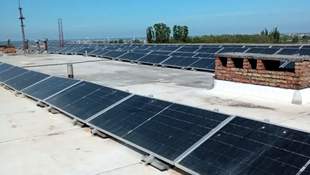Aug. 19, 2024, 9:04 a.m.
Power outages return to Odesa region
Цей матеріал також доступний українською56

Photo collage: Intent
National energy company Ukrenergo has ordered to resume stabilization blackouts.
According to the press service of DTEK Odesa Power Grids, blackouts are scheduled for August 19 from 17:00 to 21:00.
The reason for this decision is the growing electricity shortage due to the heat. Preliminary, as of the morning of August 19, one line will be disconnected at Ukrenergo's command. However, DTEK noted that the number of queues may vary depending on the current situation in the power system.
A queue is a group of household consumers and businesses that consume a certain number of megawatts. The duration of the queue and which group of consumers to disconnect right now are determined by regional power distribution companies in each region. There are six queues in each region. They include consumers who are not included in the list of critical infrastructure facilities.
Conventionally, when regional power distribution companies apply one stage of outage schedules, it means four hours without electricity per day, two stages - eight hours, three stages - 12 hours, four stages - more than 12 hours of restrictions. If, for example, three queues of outages are in effect for several hours, this means that more consumers are restricted during this period. But the duration of the queue and its switching are determined by regional power distribution companies in each region.
During the period when the heat in Odesa subsided, electricity was not cut off in the region at all, except for those consumers who were left without electricity due to the shelling of Odesa region by an Iskander missile on August 11. Almost 2,000 families were left without power supply.
Due to Russian shelling, power supply is often interrupted in Ukraine, and in particular in the southern regions. For example, on July 21, almost 30,000 consumers in the south of the country were left without electricity as a result of the occupiers' attacks.
Sept. 19, 2024, 6:28 p.m.
During the week, farmers in Mykolaiv and Kherson regions submitted 357 applications for the state support programSept. 18, 2024, 8:58 p.m.
Country of Dreams: Dobroslav announces a second tender for the renovation of a kindergarten for more than 180 millionSept. 18, 2024, 8:09 p.m.
BES reveals embezzlement at Odesa defense enterpriseSept. 18, 2024, 5:26 p.m.
In Kherson region, it was planned to spend almost 75 million on road maintenance without any reasonSept. 18, 2024, 3:28 p.m.
Residents of Mykolaiv region support the army with UAH 600 millionSept. 18, 2024, 1:32 p.m.
Journalists uncovered a scheme of overpayments for the repair of a maternity hospital in OdesaSept. 18, 2024, 10:32 a.m.
Odesa region among the leaders in the number of imported cars: which brand is the most popularSept. 18, 2024, 9:04 a.m.
Elevators will be repaired in Odesa for more than 9 million: in which districtSept. 17, 2024, 11:16 p.m.
Tax increase will not close any holes in the budget, - Odesa MPSept. 17, 2024, 8:01 p.m.
New tender for installation of monuments to fallen soldiers announced in MykolaivSept. 17, 2024, 4:58 p.m.
A businesswoman who sold alcohol now receives contracts to repair shelters in Mykolaiv region without competitionSept. 16, 2024, 7:28 p.m.
Mykolaiv plans to eliminate unauthorized landfills for two millionSept. 16, 2024, 6:24 p.m.
No one wanted to buy Belgorod-Dniester port at a discountSept. 16, 2024, 2:58 p.m.
Most charters of Ukrainian companies are now publicly available













